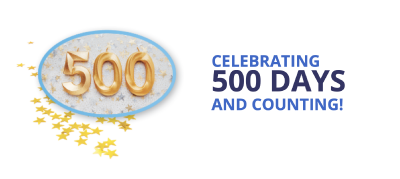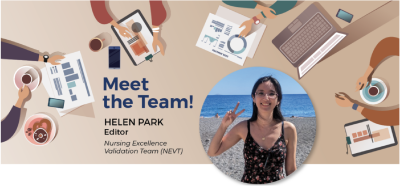
February 2025

Celebrating 500 Days and Counting
Roughly two years ago, the Tipton Health Communications Nursing Excellence Validation Team (NEVT) adjusted workflow and processes to improve our client experience. As part of this initiative, we set an aggressive goal to return client documents within 30 business days. We are proud to report that our team has met our goals for 500 consecutive business days while maintaining our focus on quality and continuing to provide our clients with schedule flexibility.
Congratulations to the NEVT on this tremendous accomplishment!

7 Tips to Keep Your Writing Team On Track for a Successful Designation Application
Meeting deadlines is critical when preparing a designation application. The process demands meticulous attention to detail, collaboration, and timely submissions. Staying on schedule ensures your narratives and supporting evidence reflect the excellence of your organization while meeting an application’s rigorous standards. Here are seven practical tips to help your writing team stay on track and deliver a polished, cohesive application.
- Set Clear Expectations: Begin the project with a comprehensive plan. Outline the goals, deadlines, and individual responsibilities for each component and supporting evidence. Break down larger deliverables into manageable milestones tied to your Magnet® writing window. Make sure team members understand their roles and how their contributions align with the broader application process.
- Utilize Collaborative Tools: Leverage project management tools like Trello, Asana, or designation-specific templates to organize tasks, track progress, and identify potential roadblocks. Collaborative platforms like Google Workspace or SharePoint are essential for sharing drafts, tracking edits, and maintaining version control. These tools create a centralized system for seamless communication and document management.
- Hold Regular Check-Ins: Consistent communication is key. Schedule regular meetings—weekly or bi-weekly—to review progress on application narratives, supporting evidence, and other deliverables. Use these check-ins to address challenges, reassign tasks if needed, and ensure alignment with Magnet® standards and timelines. This proactive approach keeps everyone engaged and focused on shared goals.
- Establish Realistic Deadlines: Designation applications are comprehensive and time-intensive. Set realistic deadlines for each milestone, factoring in time for peer reviews, edits, and leadership approvals. Avoid overly ambitious timelines that could compromise the quality of the narratives. Build in buffer time to address unforeseen delays, ensuring the final application remains on schedule.
- Foster Writing and Review Partnerships: Assign writing partners or peer reviewers within the team to collaborate on drafts and provide constructive feedback. Reviewing application narratives early and often helps identify gaps, inconsistencies, or areas requiring clarification. Encourage team members to communicate openly and ask for help when they encounter challenges. Collaboration strengthens the quality of the final product.
- Encourage Accountability and Transparency: Create a culture of ownership by encouraging team members to take responsibility for their assigned tasks. Use tools like progress dashboards to track contributions and maintain transparency. Celebrate team successes and maintain a supportive environment to address challenges collaboratively, avoiding blame if issues arise.
- Plan for Contingencies: Even with the best planning, challenges may arise during the designation application process. Anticipate potential roadblocks—such as staffing shortages, competing priorities, or last-minute edits—and have backup strategies in place. This could include redistributing tasks, extending minor deadlines, or consulting with Magnet® champions to maintain momentum.
Staying on schedule for a designation application isn’t just about meeting deadlines; it’s about fostering a collaborative environment that allows your team to produce high-quality work while aligning with standards of nursing excellence. By establishing clear expectations, encouraging accountability, and maintaining open communication, your team will be well-prepared to submit a strong, cohesive application that showcases the outstanding work of your organization.
Tipton Health offers guidance, support and services to help you and your team stay on track to a successful designation.
- MPD Boot Camp
- MPD Mentoring Program
- Magnet® Writing Workshop
- Pathway to Excellence® Writing Workshop
- Complimenary Meetings with Your Tipton Health Advocate
Want to learn more? Contact us at magnet@tiptonhealth.com

NEW SERVICE: Let Us Write Your Documents!
We are thrilled to announce the launch of our new Tipton Health Full Write service! Based on feedback from our valued clients and partners, Tipton Health’s NEVT has designed this service to offer greater support during the documentation phase of the Journey to Nursing Excellence.
You can request the service at any time. For example, the following are a few scenarios in which you might need Tipton Health Full Write support:
- Filling an Unexpected Gap on Your Writing Team: A key member of your writing team is no longer available. What to do? One of our writers will fill the gap by interviewing SMEs at your organization, evaluating supporting documents and data, and writing a select number of narratives.
- Providing Emergency Writing Support: Your submission date is closing in rapidly and you are worried you won’t have enough writing support to complete your documents. You can turn to Tipton, which will assign you a team of Tipton Health writers to give you the bench strength to complete your document on time.
- Writing the Full Document: Your nursing team is already underwater and would be challenged to take on writing your document or perhaps your team lacks experience with Magnet®. A dedicated team of Tipton Health writers will work with SMEs to write narratives, assess evidence and data, and write a draft of the entire Magnet® Designation document for your review and approval.
We have built the Tipton Health Full Write with you in mind. Our services can be tailored to meet your needs to make the writing process more efficient and to meet the unique needs of your writing team and organization.
Ready to learn more? Contact your Tipton Health Client Advocate or send a note to magnet@tiptonhealth.com to request more information and get started with the Tipton Health Full Write!

Sharing Best Practices: How to Build Nurse Resiliency
We see literally thousands of Magnet® documents each year, detailing best practices in nursing from around the nation. To share that bounty of information, we have started this new series in our newsletter detailing some of those practices that you can use to strengthen your nursing team or nursing work environment. This issue’s focus is on nurse resiliency.
Resiliency is defined by a person’s ability to adapt to unknown changes, and while individual resiliency is a strong foundation, it is vital that nurses have a sense of community within their teams and organizations. This gives nurses the ability to recognize the stress of situations, acknowledge it, and seek support for it.
Following are some best practices for building resiliency within your teams with a focus on community and self-care.
Support Physical Activity During Breaks: For nurses working long shifts, it can be hard to squeeze in the time for a good workout. Daily exercise is a great way to build resilience, however, as it reduces stress, boosts energy, enhances mood, and is part of an overall healthy lifestyle. If your organization supports a way for nurses to exercise during their breaks, it also shows that you care about their well-being. Consider setting up a dumbbell set, balance ball chairs, or standing exercise equipment in a nurses station, rarely used office, or other area with space. You can also hold fun workout challenges with exercises that require no equipment, such as squats, pushups, lunges, etc. These activities could take place during breaks on shifts, or you can set up a time for voluntary participation.
Dedicate Time for Nurses to Prepare and Catch Up: In the words of our own Mary Del Guidice, MSN, BSN, RN, vice president and chief nursing officer, Tipton Health Communications, “As nurse leaders go, so goes your team, and so go your patients.” Burnout is a significant issue in healthcare work caused by long term stress, and it is one of the most common reasons nurse managers leave the profession, which will affect your teams at all levels.
A great way to reduce nurse manager burnout is to provide protected time to enable nurse managers to be out on their units more often or to catch up on tasks that have fallen behind. This could be a dedicated day of the week where no meetings are scheduled to allow nurse managers time to work on other tasks or address concerns they have throughout the week. You might also advocate for work from home days each month, which are beneficial in that they allow dedicated time to work without the distractions of being on site. Either approach can help administrative tasks run smoothly and reduce burnout.
Provide Nurse Care Resources: A great way to build resilience and establish a sense of community for your nursing team is to provide care resources, which can be in-person or education on your site or intranet. For example, nurses of all levels can use information on things like meditation, mindfulness techniques, and similar ways to reduce stress. As for on-site care, you may consider setting up an aromatherapy room or space with a scent diffuser to promote relaxation and psychological well-being. Setting up a care cart to be rounded on your units with reminders, flyers for upcoming events, and healthy snacks can also be a great way to show your care for your nursing teams and help reduce stress.

What to Watch: Recap of 2024 Tipton Health Nursing Leadership Webinars
How Nurse Managers Can Become Great Nurse LeadersMajor topics covered during this webinar include…
- Professional and Industry Alignment – AONL Nurse Leader Competencies, ANNC Magnet® Model, and ANCC Pathway to Excellence
- Nurse managers directly impact fiscal health of organizations, quality, safety and reliability, etc.
- Competent nurse leadership increase patient outcomes and RN intent to stay.
Is Your Nurse Human? Managing the Rise of AI in Nursing
In this webinar, panelist Jerri Westphal, MSN, RN, NI-BC, manager of Nursing Informatics, Stanford Health Care, details an AI system used at Stanford to assists nurses and physicians to collaborate on patient care.
Mission Possible: Reducing Nursing Documentation Burden
Nurses can spend nearly half a shift (roughly 40%) performing documentation rather than providing direct patient care. In this webinar, Mindy Stites, MSN, APRN, ACNS-BC, CCNS, CCNS-AG, CCRN, clinical nurse specialist, Clinical Care, discusses how The University of Kansas Health System has addressed this burden on nursing staff.

Meet the Team -- Helen Park
In the ever-evolving world of healthcare, storytelling plays a vital role in illustrating progress and innovation. Helen Park, an editor at Tipton Health, has carved out a unique niche in this landscape, drawing from a rich government contracting and disaster management background. We reached out to Helen to learn more about her background and experiences working at Tipton Health.
What did you do before joining Tipton Health?
Before joining Tipton Health, I served as the editor for Optical Solutions and Technologies (OST), where my work focused on crafting documents for the Federal Emergency Management Agency (FEMA). My responsibilities included writing the “Flood Insurance Manual,” which explains flood insurance to insurers and agents selling flood insurance, and also the National Flood Insurance Program Write Your Own (WYO) bulletins, which “provide guidance for complying with the National Flood Insurance Program (NFIP’s) building performance requirements.”
Helen reflected, “I worked a lot during hurricane season, and I am glad I am not still doing that,” with a sense of relief. Her experience at FEMA involved working on critical manuals and engaging deeply with the complexities of government contracting. “It was a challenging environment, but it honed my skills,” she added.
What would you say is the most rewarding part of working on the NEVT?
One of the most rewarding facets of my role at Tipton Health is working with the NEVT. The variety of stories is inspiring. Hearing about hospitals striving for improvement gives me hope in the healthcare system.
Do you have any advice for clients throughout their Magnet® Designation journey?
As clients embark on their Magnet® Designation journey, I want to emphasize the importance of patience. There’s no set formula for the examples; every story is different and requires a unique editing process. I encourage clients who might feel overwhelmed, particularly when dealing with a limited number of stories, to communicate openly. If you’re feeling stressed, just give us what you have, and we’ll work with you to make it work.
What is your favorite Magnet® example?
If I had to highlight one example, the SE12 community involvement example is my favorite. It’s uplifting to see hospitals going above and beyond for their community.
What are you most proud of working at Tipton Health so far?
I’m most proud of getting better at EOs. They intimidated me the most when I first started, but now I actually prefer them to SOEs. Transitioning to Tipton Health marked a significant shift in my career. I’m so glad to be here. It allows me to flex my editing skills and face new challenges. At Tipton Health, I find fulfillment in the diverse range of documents we encounter, which not only stretch my abilities but also promote personal growth as both a writer and an editor.
What hobby are you most passionate about and why?
Outside of my professional life, I’m passionate about reading and immersing myself in stories from cultures around the world. It’s like being front row to a play, and literature allows me to experience diverse perspectives.
As Helen continues her journey at Tipton Health, she remains dedicated to empowering healthcare narratives and fostering meaningful change in the community.
CURRENT ISSUE
PAST ISSUES
Let Us Know How We Are Doing and How We Can Better Support You.
We are absolutely dedicated to your success. We form deep partnerships with our clients based on trust. That requires continuous conversation. Tell us how we can better serve you.
